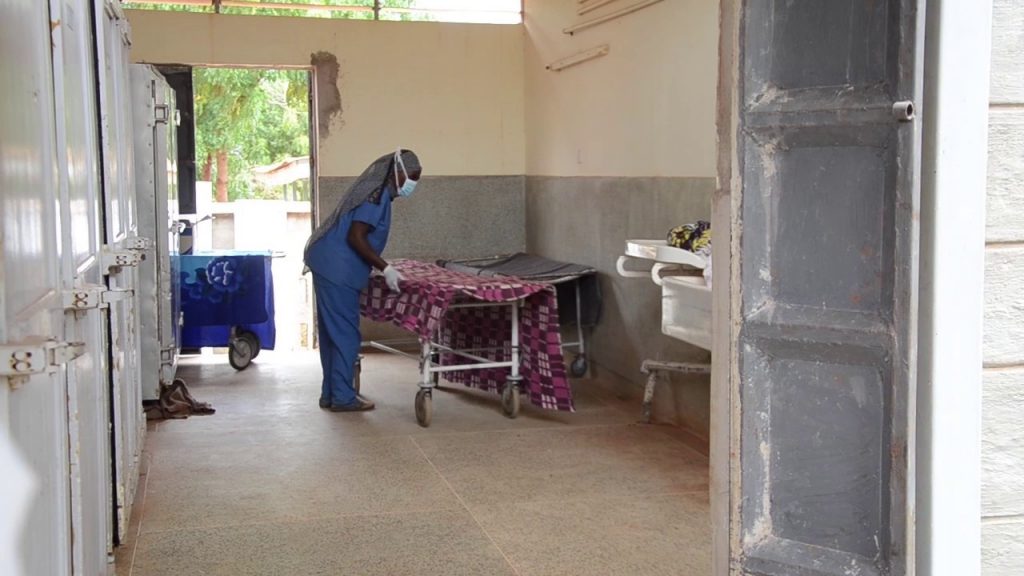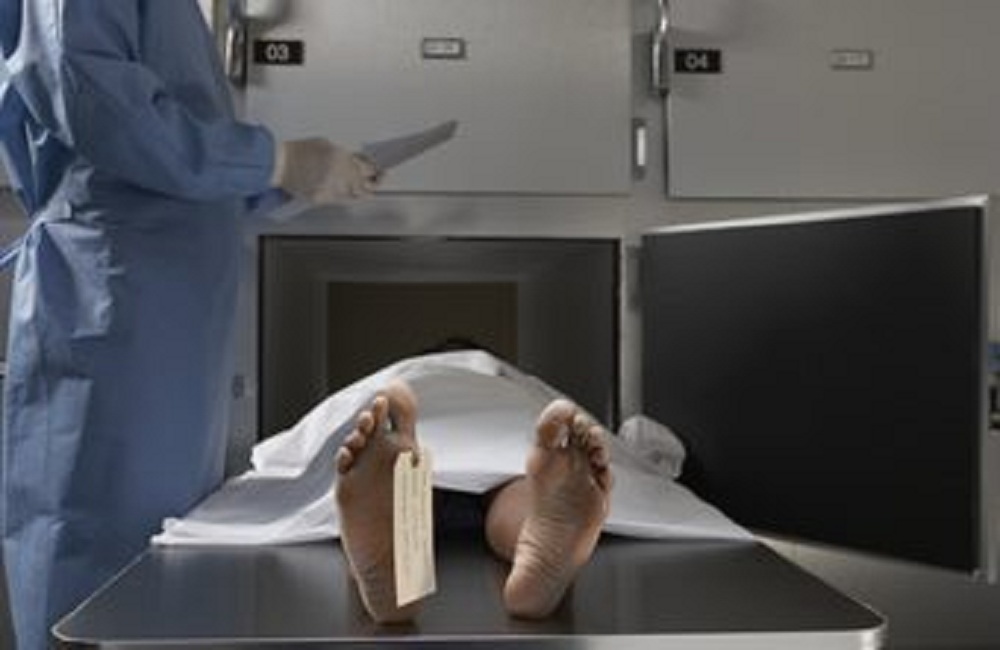From the cool, almost chilly interior of the Moi County Referral Hospital mortuary, the sharp metallic click of a rusty steel-lock handle being turned reverberates through the eerily quiet room.
Then comes the screech of a heavy cabinet door opening, followed by a drawer being dragged out. Moments later, a strong unpleasant, stuffy sneeze-inducing smell heavily tainted with formalin suffuses the air.
After a while, there is another loud screech and a bang; the drawer is slammed and the door bangs shut. The sharp whiff of embalming chemicals subsides.
The soft shuffling sound of muffled footsteps approach and from the slightly darkened doorway, she appears. Dressed in a blue ankle-length garb, cream-coloured latex gloves, a headgear and a white mouthpiece, Gladwell Wairimu, a short woman of slight build, resembles a scrub nurse who has just walked out of a surgery room.
With a practised move, she takes off her gloves and mouthpiece in a fluid unconscious gesture that is graceful to watch.
“I am a surgeon for the dead; I cut them open to find out what killed them,” she notes calmly as she drags a plastic chair under a tree some metres away from the thick mortuary walls.
Even from that distance, the steady hum of machines that keep the freezers working is audible. At the age of 37, Wairimu prides herself in being the only female mortuary attendant at Moi County Referral Hospital, the biggest health facility in Taita-Taveta County.
READ: Why men earn more than women for the same job
She prefers the grander title of ‘The Undertaker’, saying it gives her work a classy touch.
Her calm open face, self-assured smile and crinkly eyes betray nothing about what she does for a living but as a woman, she has defied cultural dictates, gender stereotypes and employment norms to work in a facility few people, men included, would dare venture in.
With over 10 years’ experience as a mortuary attendant in various morgues in Naivasha, Nairobi and the Coast region, Wairimu has seen it all. She has lost count of the bodies that have passed through her hands for preparation before their final journey in the afterlife but estimates they run into their thousands.
Understandably, most people are wont to shudder and recoil in fright at the relish she exhibits when narrating her experience with the dead bodies. The tales are as macabre as they are spooky but to the mother of eight, her passion comes from a genuine desire to give the dead the honour and respect they deserve in the afterlife.
Her love affair with the dead started in 2002 when the body of her cousin was discovered buried in a shallow grave in a house in Naivasha 11 days after she was brutally murdered by her husband. The body was at an advanced stage of cellular breakdown.
None of Wairimu’s relatives was brave enough to witness the post mortem that was conducted by police, but she volunteered and stood calmly throughout the operation; she later signed the report before going out to inform her spooked relatives what had transpired.
Long-distance trucker
“I had to be strong for my cousin; no one else was willing to stand for her in death,” she says, adding that that unique experience sowed in her heart a strong passion and compassion for the dead.
Further, her passion grew when she was employed as a long-distance trucker.
“In the course of my work, I would witness hundreds of fatal accidents along the highway,” she says, noting that as a trucker, it was her responsibility to assist fellow road users and so was actively involved in retrieving the injured from the crash sites and extracting dead bodies from mangled wrecks.
With such a gory background, it comes as no surprise that Wairimu would finally find her true calling working among the dead. She admits that working at the Moi county referral morgue is one of the most challenging experiences for ‘the undertaker’.
SEE: 24 simple steps that will transform your life
Unlike other public mortuaries, Moi hospital morgue is one of the busiest. Being a public mortuary, it acts as a dumping site for all bodies found along the Nairobi-Mombasa highway or recovered from Tsavo National Park.
Apart from accident victims and patients who pass away while undergoing treatment at the hospital, the morgue is also the sole recipient of bodies of poachers killed inside the expansive Tsavo Park.
Even with her years of experience as a morgue attendant, she concedes that some assignments are very challenging especially if they involve dealing with bodies left for long at the mercy of the elements in the expansive park.
“Some are partially devoured by wild animals and it is up to me to reconstruct them and make them look almost as presentable as they did when alive,” she says adding: “The sweltering temperatures in the region accelerate the dissolution of body tissues left out in the open.”
Once they are brought into the morgue, her work starts. It involves careful reconstruction to ensure bodies appear intact to family members.
“This is often the case where a body is badly damaged and needs to be fixed through re-attachment of parts that were torn apart,” she says.
Wairimu says that it also involves administering of formaldehyde; a powerful chemical that once mixed with water becomes a preservative and keeps the body in good condition.
ALSO SEE: Would-be pilot ends up as mortuary attendant
She points out that one must be well-versed in physical sciences so as to know the right amount of chemicals to administer. Knowledge on how to determine aspects like body mass and location of veins in the body comes in handy to avoid destroying the body.
“Most people think morgue workers are an unintelligent lot who only require to be able-bodied enough to carry corpses,” she says adding that if too little formalin is applied, it would slow down body cellular breakdown for a body with a large mass.
“But we do more than that. We carefully administer chemicals intravenously to ensure the body doesn’t go bad. We must be good in body science too,” she says.
Her most trying moment is trying to find the next of kin to claim the body of their loved one.
“The dead need love just like the living. Abandoned bodies which lie in the mortuary months on end break my heart,” says Wairimu.

She opines that relatives and family members of the deceased might be desperately trying to find their loved one; it is her responsibility to try all channels to trace and inform them of the whereabouts of the deceased.
“When I can’t trace them, I resignedly accept that the body must be disposed of and it is then buried in an unmarked grave according to hospital regulations, after obtaining disposal orders from the court,” she notes.
Wairimu defends her colleagues, saying that undertakers are the most misunderstood employees by the public, with many believing that morgue attendants are heavy drug abusers who cannot function unless they are stoned.
“Personally, I have never used drugs in my life; understanding that the dead are part of society is the key to living at peace even in the mortuary,” says Wairimu, who is comfortable in eating snacks and drinking between postmortem breaks.
She says the only difference between working with the living and the dead is that the latter are silent and don’t talk back to her, adding she equates such silence to having friends who didn’t speak.
Wairimu praises the hospital administration and her male colleagues for not discriminating against her because she is a woman.
Taboo
“I faithfully attend my shifts and have never asked them to reduce my workload or to assign me a less strenuous shift,” says Wairimu adding that this is an indicator that men do recognise that women can perform assignments that appear daunting.
She, however, expresses regret that some of her relatives stopped speaking to her, averring that it is a taboo for a woman to earn a living from handling dead bodies.
“Such views come from lack of understanding the role a mortician plays,” she notes.
Moi Hospital administrator Richard Nguti terms ‘The Undertaker’ as very passionate about her work.
“She is always punctual, prompt and dedicated; an asset to the department of the morgue at the facility,” he adds.
Related: What killed Dr Mukhisa Kituyi’s son?
Wairimu attributes her strength to the massive support she receives from her immediate family which has not been affected by her work.
“In fact, my husband is very supportive,” she discloses saying that if he wasn’t gainfully employed, her work would support the family adding that he even encourages her to put in extra hours to earn extra cash.
Her children are also intrigued by her work in a morgue and one time they were excited when they found her wrapping up a postmortem operation.
“The children went home and narrated to a terrifying house help what their mother does for a living. That was the last time my house help ever washed my clothes,” she said noting that she couldn’t bear to touch them.
Despite the challenges she grapples with in her line of work, Wairimu plans to one day open a low-cost funeral home which will cater for low-income earners where she will offer top-class services at affordable prices.
“Operating a funeral home is good business; however, the exorbitant prices charged by private funeral homes is a drain on the finances of poor people,” she says.
“My future investment will be a morgue. This is a service that is needed by all and I hope to achieve that dream,” she says.










Thanks for taking the time to share this post, I feel strongly concerning it and love reading additional on this topic.
Thank you for such a good passage discussed. I really have a great time understanding it.